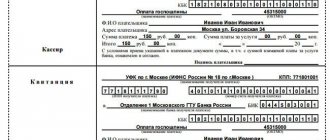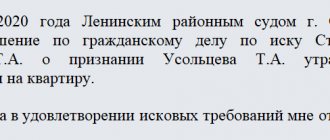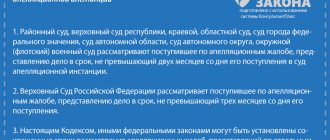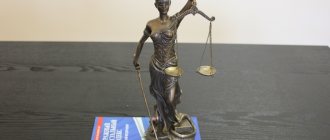An appeal in a criminal case is the first stage of appealing judicial acts. You can challenge both the final court decision (sentence, ruling, ruling) and all acts (rulings, rulings) issued as part of the criminal investigation and trial. The complaint is subject to consideration by a higher court. In practice, such a court is usually a district court in relation to justices of the peace and a court of a federal subject in relation to district courts of the region.
In 2021, no later than October, the courts of appeal should begin work . They will become a special appellate court, which will appear for the first time in the system of courts of general jurisdiction. Its powers are to consider appeals against decisions of regional courts. A total of five appellate courts will function: one court for several federal subjects. But for now, the old appeal system is still in effect, and the procedure itself, if you do not take into account the changing organization of the courts, will not change radically.
Types of judicial acts and the procedure for appealing them
Article 389.2 of the Code of Criminal Procedure of the Russian Federation identifies three groups of judicial acts that can be appealed to the appellate instance. Each group has some appeal features:
- Final decisions of the court of first instance - a verdict of guilty or acquittal, a decree or a ruling to terminate a criminal case (prosecution).
- Judicial acts (rulings, decisions) issued as part of the trial. During the consideration of a criminal case, the judge (court) can make decisions on various issues. As a general rule, such judicial acts cannot be appealed immediately. If there is a need to challenge them, this can only be done together with an appeal of the court decision based on the results of the process.
- Judicial acts issued as part of a criminal investigation and during a trial, which can be appealed immediately, without waiting for a final decision in the case. Such acts include:
- the decision of the magistrate to return the application or to refuse to accept it;
- decision to select a preventive measure or extend it;
- decision on placement in a medical hospital;
- decision on placement in a medical psychiatric hospital for examination;
- decision on the seizure of property, setting the period of such arrest or its extension;
- decision to suspend the proceedings;
- decision to transfer the case according to jurisdiction or change jurisdiction;
- decision to return the case to the prosecutor;
- private definitions (decrees);
- other judicial acts (procedural decisions) that block further progress in the case.
The nuances of challenging the above judicial acts relate mainly to the emergence of the right to appeal. Otherwise, the procedure for preparing, filing and considering an appeal does not differ significantly.
To the Judicial Collegium for Criminal Cases
Moscow City Court
from lawyer Balamutov K.A.
T.
In criminal case No. 00000 on charges against A.A. Ivanov, under Part 3 of Art. 30, paragraph “a”, part 2, art. 228-1 of the Criminal Code of the Russian Federation.
APPEAL
on the decision of the Khoroshevsky District Court to extend the preventive measure
in order Part 3 Art. 389.2 Code of Criminal Procedure of the Russian Federation
By resolution of the Khoroshevsky District Court of Moscow dated January 1, 2008. (hereinafter referred to as the Resolution) Ivanov A.A. a preventive measure in the form of detention was chosen.
According to the Resolution, Ivanov A.A. accused of committing an attempt on the illegal sale of narcotic drugs by a group of persons by prior conspiracy. So he, having entered into a relationship with Petrov A.A. and Sidorov A.A. in a preliminary criminal conspiracy for the illegal sale of narcotic drugs and acting with accomplices jointly, with a single intent aimed at the illegal sale of narcotic drugs, and according to distributed roles, while Petrov A.A. and Sidorov A.A. found and acquired from an unidentified source, for the purpose of subsequent sale, the narcotic drug hashish, he (Ivanov A.A.) on July 30, 2008 found a buyer for the narcotic drug - Trofimova, arranging a meeting with her. In the future, he, Petrov A.A. and Sidorov A.A. arrived to meet with Trofimova, who was acting during the operational-search event “test purchase”. Ivanov A.A. received money from Trofimova in the amount of 1,800 rubles, after which he transferred it to his accomplice A.A. Petrov, who in turn sold Trofimova the narcotic drug hashish with a total weight of 0.7 grams.
Further, according to the decision, the court believes that “There are grounds for changing the choice chosen in relation to Ivanov A.A. a preventive measure in the form of detention for something other than imprisonment was not presented to the court. The preliminary investigation body provided sufficient data confirming the validity of the application to Ivanov A.A. preventive measures in the form of detention because he was charged with committing a crime under Art. 15 of the Criminal Code of the Russian Federation, to the category of especially serious crimes, and taking into account the specific circumstances of the crime and the actual circumstances of the act of which A.A. Ivanov is accused, there is reason to believe that, remaining at large, he may interfere with establishing the truth in the case, i.e. .e. hide from the investigative authorities and the court.”
We believe that this resolution is illegal, unfounded and subject to cancellation due to the following circumstances.
In accordance with Part 1 of Art. 108 of the Code of Criminal Procedure of the Russian Federation, when choosing a preventive measure in the form of detention, the judge’s decision must indicate specific factual circumstances on the basis of which the judge made such a decision. The above resolution formally lists the provisions of the Code of Criminal Procedure of the Russian Federation and the petitions of the SS investigator of the Federal Drug Control Service for the election of a preventive measure, without indicating specific circumstances.
The Resolution of the Presidium of the Supreme Court of the Russian Federation dated September 27, 2006 “On consideration of the results of a generalization of judicial practice on the selection of a preventive measure in the form of detention of suspects or accused of committing crimes” indicates the inadmissibility of a formal approach to resolving petitions for detention, since this the most severe preventive measure that restricts the rights, freedom and personal integrity of a person and a citizen. It states that “the judges in their decisions only formally listed those specified in Art. 97 of the Code of Criminal Procedure of the Russian Federation, grounds for choosing a preventive measure in the form of detention, without providing specific, comprehensive data on the basis of which the court came to the conclusion that the suspect or accused may escape and continue to engage in criminal activities.”
In accordance with the appealed decision, the court’s conclusions about the possibility of Ivanov A.A. to hide from investigation and trial, as well as to continue to engage in criminal activities are in the nature of assumptions and conjectures. At the same time, the court did not assess the fact that Ivanov A.A. registered in Moscow, lives with his parents, studies at the Institute of Foreign Languages, where he has a positive character. Age of Ivanov A.A. He is 19 years old and has never been subject to criminal or administrative liability before.
A.A. Ivanov cannot. and prevent the establishment of the truth in the case because Immediately after his arrest, he provided the investigation with candid testimony, as well as a statement of readiness to cooperate with the investigation. These circumstances were not studied by the court and no assessment was given to them.
In accordance with paragraph 14 of the Resolution of the Plenum of the Supreme Court of the Russian Federation dated October 10, 2005 No. 5 “On the application by courts of general jurisdiction of generally recognized principles and norms of international law and international treaties of the Russian Federation,” the circumstances justifying the isolation of a person from society “must be real, justified, those. be confirmed by reliable information." It is also stated that courts must indicate not only specific circumstances, but also evidence confirming the existence of such circumstances. The appealed decision does not contain such evidence.
In addition, Ivanov A.A. He was treated by a therapist for vegetative-vascular dystonia (see certificate from the city clinic No. 139), in 2004 he was diagnosed with moderate myopia in both eyes. Further stay of Nikolaev A.S. in an isolation ward could have a negative impact on his health.
Noteworthy is the initially inattentive and unthoughtful attitude of Judge E_______ to this process, which characterizes an absolutely indifferent attitude to the issue under consideration. So, according to the decision, the judge indicated: “...A.A. Ivanov....remaining at large (?)...may interfere...”. Judge Eremina most likely did not notice that Ivanova A.A. was delivered to the courtroom by convoy, which indicates that until November 28, 2008, i.e. before the court hearing Ivanov A.A. was in custody. Earlier, from the date of initiation of the criminal case, Ivanov A.A. I was not free for a single day or an hour. In this regard, the judge’s thoughts about the harmful and illegal actions of Ivanov A.A. who is at large are absurd and have the nature of conjecture and assumptions.
The defense is extremely perplexed by the phrase in the resolution: “... he (A.A. Ivanov) can interfere with establishing the truth in the case, i.e. hide from the investigative authorities and the court.” In other words, it is unclear how the judge came to the conclusion that establishing the truth in the case means it is impossible to hide from the investigative authorities. Hence the conclusion that the TRUTH in the criminal case is none other than A.A. Ivanov, held in custody in a detention center. And in the absence of this condition (A.A. Ivanova is in custody), the truth in the case cannot be established.
Based on the above, guided by Part 11 of Art. 108 Code of Criminal Procedure of the Russian Federation
ASK
1. Cancel the Resolution of the Khoroshevsky District Court of Moscow dated August 1, 2008.
2. Elect Ivanova A.A. as a preventive measure other than imprisonment.
Appendix: order No. BC - 0000
Lawyer K.A. Balamutov
Attention: dates, data of persons, organizations, investigative bodies and courts have been changed
Who can appeal
In this part, three groups of people can be distinguished:
- The direct participants in the process are the defense and prosecution. A suspect, accused, defendant, convicted, acquitted, a person against whom the case has been dismissed by the court, as well as their representatives (legal representatives, defense attorneys) have the unconditional right to appeal. On the part of the prosecution, the unconditional right to appeal belongs to the victims, their representatives and the prosecutor's office.
- Participants in the process in the status of civil plaintiff and defendant, who do not simultaneously have another status (for example, victim or accused). Such persons are limited in their right to appeal and can file an appeal only insofar as it relates to a civil claim in a criminal case.
- Any other persons whose rights, freedoms and interests are affected by the contested judicial act. These persons have the right to file an appeal only regarding the violation of their rights, freedoms and interests.
The lion's share of complaints falls on the defense side. The victims and the prosecutor's office follow her. Unlike other persons, the prosecutor's office prepares not a complaint, but a presentation. True, the differences are only in the form of address.
Result
The outcome of the appeal proceedings may be:
- its termination;
- reversal of the contested sentence and imposition of a new, worsening, position of the convicted, acquitted or suspected person, in whose direction the criminal case was terminated at first instance;
- change of decision or sentence;
- reversal of the verdict and transfer of the case to the court that issued the appealed act;
- cancellation of the act and return of the case to the prosecutor;
- reversal of the decision and termination of the criminal case;
- reversal of a judge's acquittal based on a jury's acquittal.
If the decision made at the second instance, in the opinion of one of the parties to the trial, turned out to be unlawful or violated the legal rights of another person, it can be appealed at the third instance through cassation proceedings. There is no deadline for submission.
Appellate instance
Currently, the appeal (submission) is being filed:
- To the district court - for judicial acts of the magistrate.
- To the criminal board of the relevant regional court - on judicial acts of district courts and interim judicial acts of the regional court within the framework of the consideration of the case.
- To the Judicial Collegium of the Armed Forces of the Russian Federation - on the final decisions of courts at the regional level.
- To the Appeals Board of the RF Supreme Court - against the decisions of a judge of the RF Supreme Court.
As soon as the appellate courts begin their work, complaints against judicial acts adopted by courts at the regional level will be addressed to these special courts.
The appeal must be prepared to the appellate authority, but is initially sent to the court whose decision is being appealed, and then transferred to the appeal.
Deadlines for appeal
You have 10 days to file an appeal . The period begins from the day the appealed judicial act is issued. If the complaint is prepared by a convicted person in custody, then the 10-day period begins from the day he is given a copy of the appealed decision.
The missed deadline can be restored . This requires valid reasons for absence and their confirmation. The issue of reinstating the term is decided by the court, whose decision is being appealed. This falls within the competence of the judge presiding over the meeting (in case of a collegial consideration of the case) or another judge (in case of a single consideration of the case).
As a rule, if a deadline is missed, both a complaint and an application to restore the deadline are simultaneously prepared, which are then submitted together to the court whose decision is being appealed. Next, the chairman of this court determines which judge will decide on the restoration of the missed deadline. If the restoration of the term is refused, such a decision can be appealed to a higher court. In this case, the appellate court has the right to satisfy such a complaint and at the same time consider the appeal on its merits.
Download the application for restoration of the deadline for an appeal (sample)
How to prepare an appeal
The complaint must be prepared in writing. In terms of content, it must comply with the requirements listed in Art. 389.6 Code of Criminal Procedure of the Russian Federation.
It is necessary to indicate:
- The name of the appellate authority, that is, the court to which the complaint is filed.
- Full name, place of residence/location and procedural status of the person filing the complaint.
- Which judicial act(s) is being appealed, by which court and when it(es) was adopted.
- What exactly is the disagreement with the appealed judicial act, what are the grounds for canceling or changing this decision. All possible grounds are listed in Art. 389.15 Code of Criminal Procedure of the Russian Federation (exclusive list):
- the conclusions set out in the verdict do not correspond to the circumstances of the criminal case established by the court;
- the Code of Criminal Procedure of the Russian Federation has been significantly violated;
- the Criminal Code of the Russian Federation was incorrectly applied (for example, the wrong classification of the offense was given);
- the verdict is unfair;
- the pre-trial cooperation agreement was violated;
- there are grounds for returning the case to the prosecutor, listed in Part 1 and Clause 1 of Part 1.2 of Art. 237 Code of Criminal Procedure of the Russian Federation.
- What rights and interests are violated by the appealed judicial act (only for cases when the complaint is prepared by a person who is not a participant in the criminal case and process).
- Justification of the complaint - arguments and evidence in favor of the existence of grounds for canceling or changing the appealed judicial act.
- A petition for a re-examination of evidence previously considered in the court of first instance, listing such evidence, as well as the persons who need to be summoned to the hearing of the appellate court (if such a study is necessary).
- A petition to consider new evidence at the appellate court hearing and to summon new persons to the court to testify, listing the evidence and data of such persons (if necessary). Such a petition must necessarily be supported by arguments about the impossibility of presenting the listed evidence earlier and an explanation of the reasons for this.
- Request for participation in the meeting to consider the complaint (if you wish to participate).
- Request to the appellate authority (to cancel the judicial act, change it in part or completely).
- List of attachments to the complaint.
- Date and signature.
appeal in a criminal case
If the complaint does not meet the requirements and violations become an obstacle to its consideration, the court will return the document for re-drafting and set a deadline for correcting errors and violations.
Having received the complaint and its attachments, the court whose decision is being appealed notifies other participants in the process about the receipt of materials and explains the right to prepare their objections. If objections are received (prepared in writing), they will be added to the case materials and then sent along with the complaint to the appellate court.
Documents and evidence
All arguments and circumstances specified in the complaint must be confirmed documented, visually (through objects, photographs or videos) or with the help of reliable testimony of witnesses.
The accompanying package of documents should include:
- copies of the appeal (according to the number of participants in the process);
- testimony of witnesses, presented on paper and signed by them personally;
- other significant documentary evidence and copies of materials.
It is important to remember the inadmissibility:
- evidence obtained illegally;
- testimony of the accused/suspect, given by him in the absence of a lawyer during pre-trial proceedings (applicable also to cases of the suspect’s refusal to have a lawyer who was not confirmed by him at the official hearing of the case);
- testimony of witnesses citing an unreliable source or hiding it;
- material and intangible evidence obtained during operational search and investigative actions (except for instruments of crime and objects containing traces of crime).
Sample
To draw up an appeal, you can use the following sample







